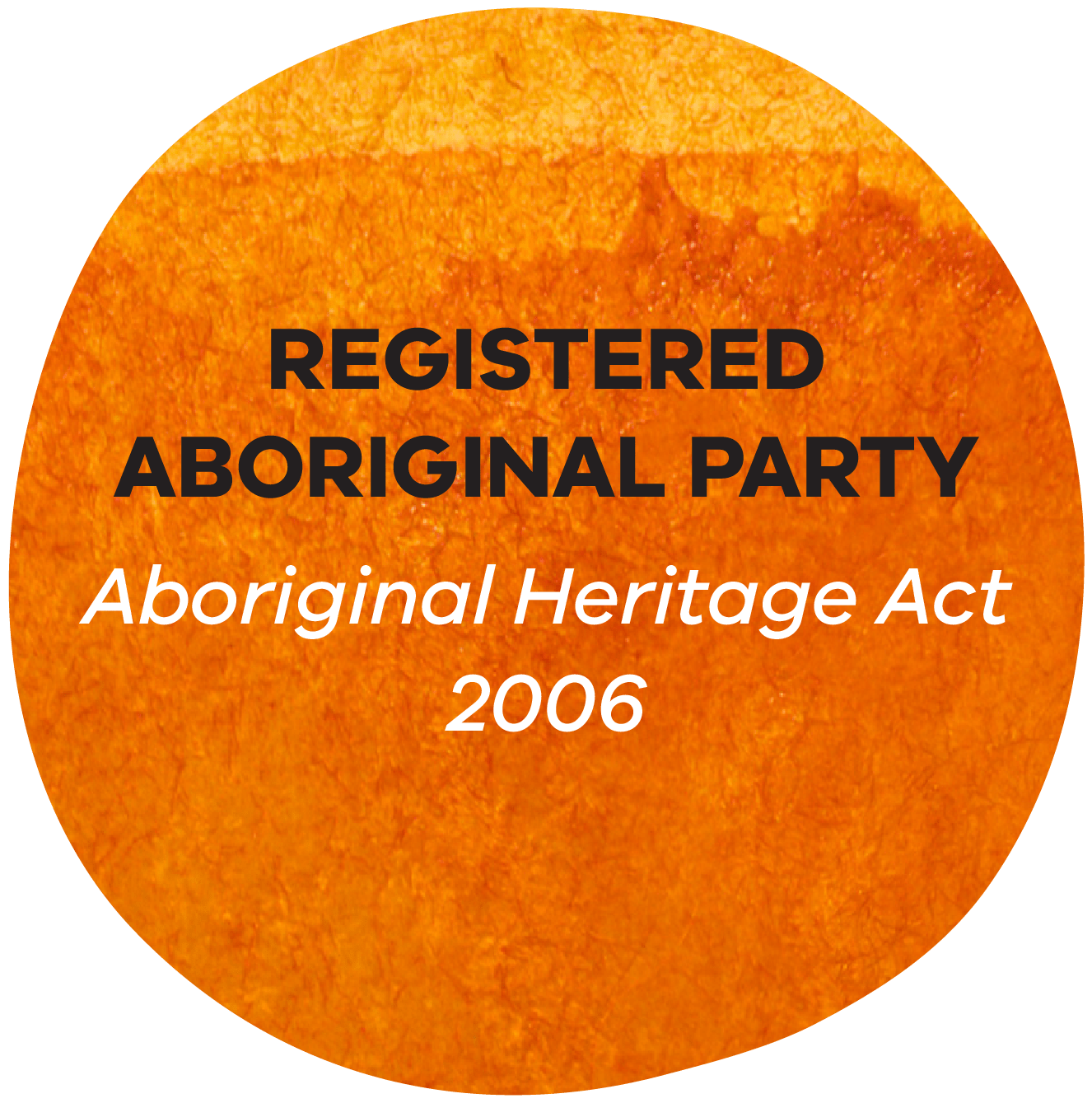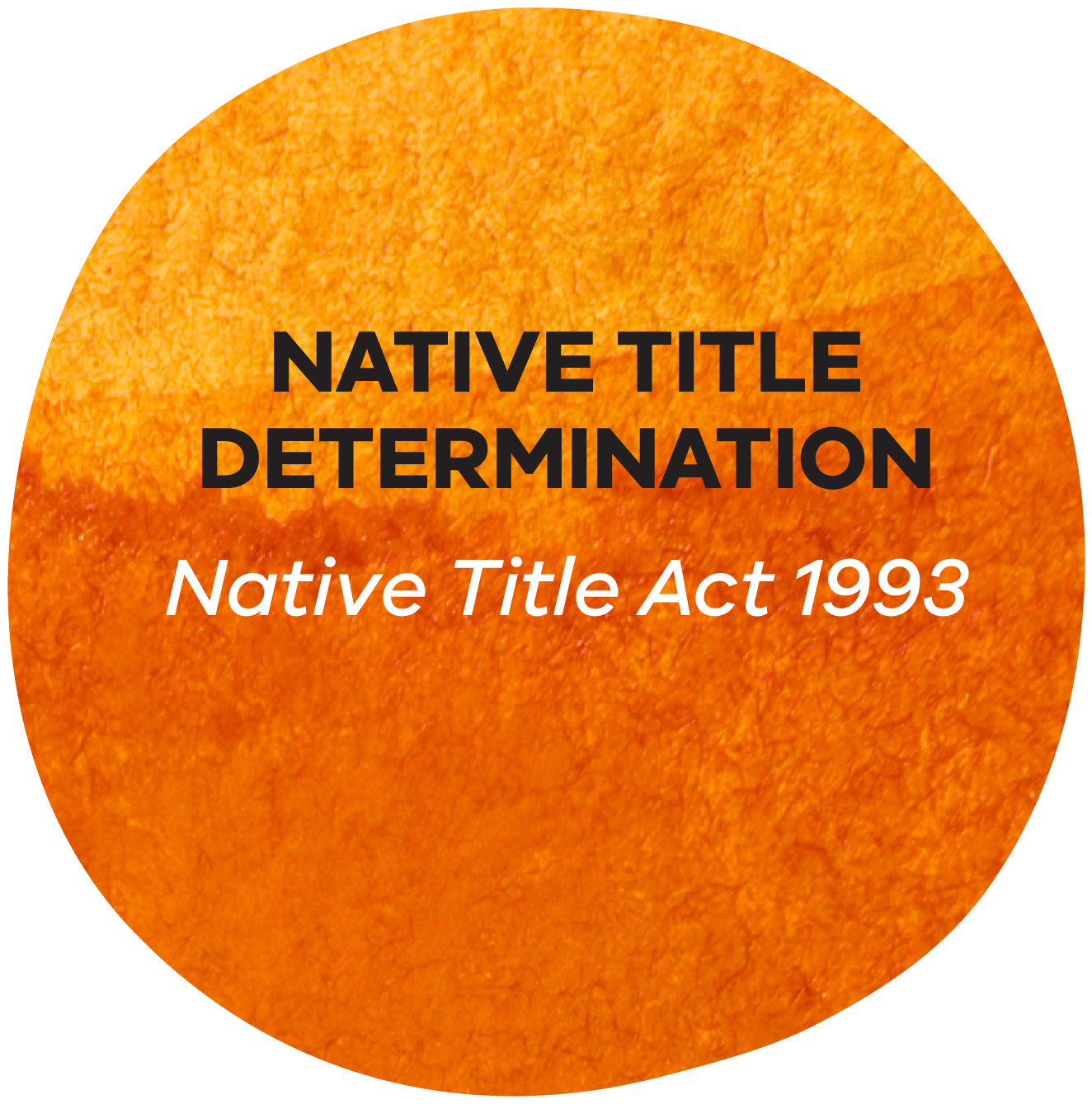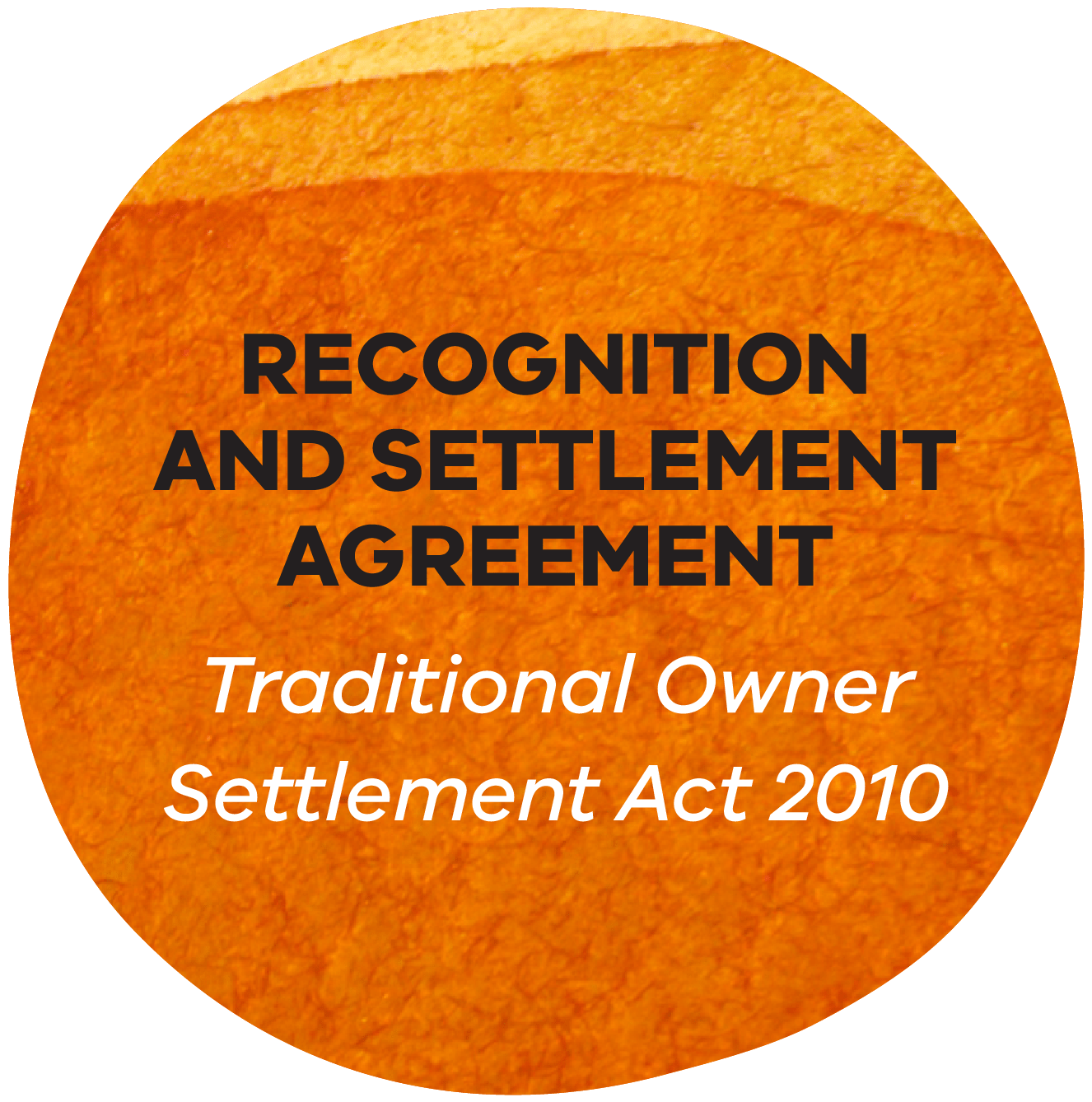- Date:
- 11 Sep 2019
Formal recognition processes in Victoria
In Victoria, there are three different processes for groups to become formally recognised as Traditional Owners of Country.
In Victoria, there are currently three different processes for groups to become formally recognised as Traditional Owners of Country.
Traditional Owners seeking formal recognition can pursue any or all of these processes.
Registered Aboriginal Party – Aboriginal Heritage Act 2006
Registered Aboriginal Parties (RAPs) are responsible for managing Aboriginal cultural heritage within their appointed areas.
RAPs are appointed by the Victorian Aboriginal Heritage Council, a statutory body made up of Victorian Traditional Owners, established under the Aboriginal Heritage Act 2006.
RAP responsibilities apply to all land and waters in a RAP’s appointed area.
Traditional Owners can apply to become a RAP by submitting an application form and supporting materials to the Victorian Aboriginal Heritage Council.
Native Title Determination – Native Title Act 1993
Native title is a bundle of rights, including property rights held by Aboriginal and Torres Strait Islander peoples under their traditional laws and customs, which pre-dates colonisation and is recognised by Australian law.
Native title applies to public land and waters, except where native title has been ‘extinguished’.
Native title is determined by the Federal Court of Australia or, on appeal, by the High Court. To initiate this process, an application is made to the Federal Court by Traditional Owners.
Recognition and Settlement Agreement – Traditional Owner Settlement Act 2010
The Traditional Owner Settlement Act 2010 provides a framework for the recognition of Traditional Owner rights and settlement of native title claims in Victoria.
Recognition and Settlement Agreements apply to public land and waters with some exceptions.
A Recognition and Settlement Agreement is negotiated by Traditional Owners with the Victorian Government. It provides recognition and a financial and land management package.
Requirements and considerations for formal recognition
Some of the requirements that Traditional Owners need to consider as they pursue formal recognition are similar across all three processes, while others are specific to each process.
All groups need to consider the following:
Right People - Groups need to demonstrate that they are inclusive and representative of all Traditional Owners with interests and rights to Country.
Right Country - Groups need to demonstrate a connection to a defined area of Country. Agreeing on boundaries with neighbours is encouraged.
Decision Making - Groups need to have agreed decision-making structures and processes in place.
Capability - Groups need to have the organisational capability to sustainably manage the legal responsibilities that flow from formal recognition.
Incorporation - Groups need to appoint a corporation to act for them under the Corporations (Aboriginal and Torres Strait Islander) Act 2006.
Requirements that are specific to each process include:
Registered Aboriginal Party – Aboriginal Heritage Act 2006
The Aboriginal Heritage Act 2006 sets out the requirements for appointment as a Registered Aboriginal Party (RAP).
In addition to considerations listed above, requirements and considerations include:
Evidence the group has resolved group composition and boundary disputes with neighbouring Traditional Owner groups
Organisational capacity to effectively perform the functions of a RAP
Expertise in cultural heritage management
Organisational sustainability (e.g. an operational plan)
Registered with the Office of the Registrar of Indigenous Corporations.
If a group has a positive native title determination or becomes a Traditional Owner Group Entity under the Traditional Owner Settlement Act 2010, they will be appointed as a RAP if they apply.
Native Title Determination – Native Title Act 1993
An application for a determination of native title is made to the Federal Court of Australia and must demonstrate that the Traditional Owners making the claim hold rights and interests in an area of land and/or waters according to their traditional law and customs.
This includes demonstrating that those laws and customs are currently acknowledged and observed in a continuous connection.
An application goes through registration testing and public notification, inviting parties to join the proceedings.
When the Court makes a positive determination of native title, a group of native title holders must nominate a Prescribed Body Corporate to act as agent for them or to hold their native title in trust.
Recognition and Settlement Agreement – Traditional Owner Settlement Act 2010
The State can negotiate a Recognition and Settlement Agreement with:
a Traditional Owner group that can enter into an Indigenous Land Use Agreement under the Native Title Act 1993 agreeing not to make future native title claims,
a Traditional Owner group that has a positive native title determination, or
if neither of the above can apply, then a Traditional Owner group that the Attorney-General recognises as the Traditional Owners of an area based on Aboriginal traditional and cultural association.
The steps that a group needs to take before seeking settlement negotiations with the State will depend on their circumstances. Traditional Owners do not need to make a native title claim in order to seek a Recognition and Settlement Agreement.
Outcomes of formal recognition
Formally recognised groups have rights and responsibilities as recognised Traditional Owners of Country. Below are specific outcomes that may arise from each of the three formal recognition processes.
Registered Aboriginal Party – Aboriginal Heritage Act 2006
Registered Aboriginal Parties have cultural heritage responsibilities under the Aboriginal Heritage Act 2006. These include the evaluation of cultural heritage management plans and decisions about cultural heritage permit applications.
RAPs also: provide advice to government and to the Victorian Aboriginal Heritage Council about Aboriginal places and objects; negotiate the return of Aboriginal cultural heritage and Ancestral Remains; participate in cultural heritage agreements, protection declarations and intangible heritage processes; consult with sponsors and heritage advisors; undertake cultural heritage assessments, and engage in compliance and enforcement activities.
On appointment, RAPs receive an establishment grant and the right to collect fees for cultural heritage management activities. RAPs also receive annual operational funding for an Executive Officer, Cultural Heritage Officer and Administration Officer.
RAPs are eligible for funding for an Aboriginal Heritage Officer position to monitor compliance and enforce the Act.
Native Title Determination – Native Title Act 1993
A positive native title determination involves recognition by the Federal or High Court that a groups’ rights continue from before European colonisation to the present day.
It also lists the native title rights determined; for example, to camp, hunt, fish, gather food, and teach law and custom on Country.
Native title holders and registered native title claimants have rights under the Future Acts regime (such as the right to comment on or negotiate agreements) in relation to activities on Country that affect native title rights and interests.
The Native Title Act 1993 also allows for claims for compensation from the Commonwealth or State governments, for acts that have ‘extinguished’ or ‘impaired’ native title rights and interests.
Native title Prescribed Bodies Corporate (PBCs) have a statutory role in making native title decisions and consulting with native title holders. PBCs may be eligible for Commonwealth funding for capacity building.
Recognition and Settlement Agreement – Traditional Owner Settlement Act 2010
The Traditional Owner Settlement Act 2010 provides a framework for the State and a Traditional Owner group to agree to a comprehensive settlement package. This can include:
- A Recognition and Settlement Agreement recognising the named Traditional Owner group and their traditional rights over Country
- A joint Recognition Statement that acknowledges the depth of the Traditional Owner group’s relationships to Country and their survival, as well as the disruptions and harms of European colonisation, and that also commits the State and the group to a mutual partnership going forward
- A binding Indigenous Land Use Agreement that ‘settles’ all native title claims and opts into the Traditional Owner Settlement Act 2010. A Settlement Agreement does not extinguish native title rights and interests but involves an agreement to exercise similar rights and interests under this agreement, and not under the native title regime
- A Land Agreement providing land transfers and grants of Aboriginal title
- A Land Use Activity Agreement providing rights for Traditional Owner groups to be consulted on, compensated for and to consent to certain activities on public land within their Country.
- A Natural Resource Agreement providing rights to use certain natural resources, including for commercial purposes, and participate in natural resource management
- A Funding Agreement, providing payments into the Victorian Traditional Owners Trust and/or payments to the Traditional Owner Group Entity
- A Traditional Owner Land Management Agreement, regarding joint management of parks and reserves granted as Aboriginal title
- Compensation that may be owed by the State for extinguishment or impairment of native title rights and interests.
What about treaty?
The Treaty process in Victoria is still being established. The Advancing the Treaty Process with Aboriginal Victorians Act 2018 is Australia’s first-ever treaty legislation. In 2019, elections to the First Peoples’ Assembly of Victoria (the Assembly) will take place. The Assembly will be the voice for the Aboriginal community in the next phase of Treaty and will work with the State to prepare for Treaty negotiations, including establishing a Treaty Authority, a negotiation framework and a self-determination fund. The Assembly will be made up of Traditional Owners, elected by Aboriginal people in Victoria and Victorian Traditional Owners living outside the state. Each formally recognised Traditional Owner group will be entitled to a reserved seat on the Assembly. If a group achieves formal recognition later, they will also receive a reserved seat.
More information
Federation of Victorian Traditional Owner Corporations
Is the peak body facilitating a collective voice for Traditional Owners to self-determine their future, focusing on shared interests and strategies for broadening political engagement, informing policy, and increasing economic and caring for Country opportunities.
- Website: www.fvtoc.com.au
- Phone: 03 9321 5388
First Nations Legal & Research Services
Is the native title service provider for Victorian Traditional Owners. First Nations offers Traditional Owner claimant groups in Victoria legal and mediation expertise to process claims and to make associated agreements. It also provides historical and anthropological research to establish the basis for native title claims.
- Website: fnlrs.com.au
- Phone: 03 9321 5300
Victorian Aboriginal Heritage Council
Is a statutory body of Traditional Owners working with the community to promote respect for and understanding of Aboriginal cultural heritage and the cultural responsibilities of Traditional Owners. It appoints and oversees Registered Aboriginal Parties. Guidelines for submitting a RAP application can be found on their website.
- Website: aboriginalheritagecouncil.vic.gov.au
- Phone: 03 7004 7198
Office of the Registrar of Indigenous Corporations (ORIC)
Supports and regulates corporations registered under the Corporations (Aboriginal and Torres Strait Islander) Act 2006 (CATSI Act). ORIC advises Aboriginal entities on how to incorporate and offers directors and members training in all aspects of good governance. ORIC also monitors corporations’ compliance with the law and intervenes as needed.
- Website: oric.gov.au
- Phone: 1800 622 431
Land Justice Unit
The Land Justice Unit within First Peoples – State Relations is responsible for administering and implementing the state’s responsibilities under the Native Title Act 1993 (Cth) and the Traditional Owner Settlement Act 2010 (Vic). This includes leading agreement-making with Traditional Owner groups to resolve native title and address land justice.





